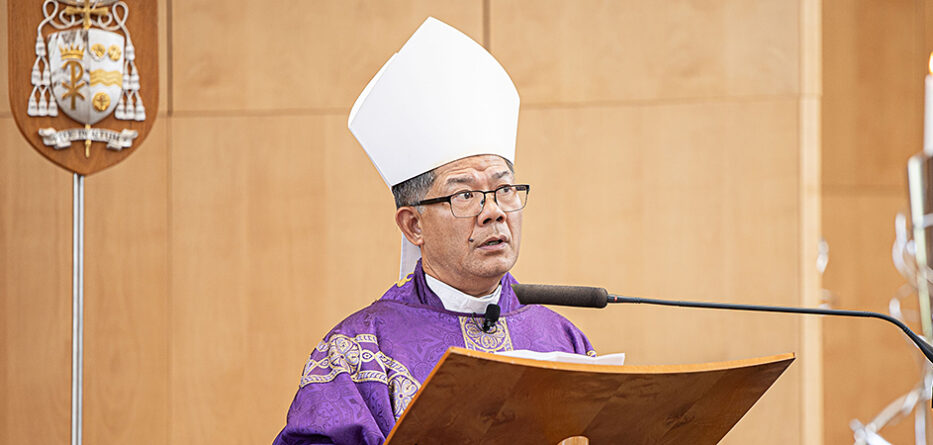Most Reverend Vincent Long Van Nguyen OFM Conv DD STL, Bishop of Parramatta
Homily for the Fifth Sunday of Lent, Year B
Readings: Jeremiah 31:31-34; Psalm 50(51):3-4, 12-15; Hebrews 5:7-9; John 12:20-33
17 March 2024
Living deeply the paschal mystery
Dear sisters and brothers,
There is so much suffering in the world at the moment. Like many of you, my heart aches as I see the tragedy unfolding in Gaza. The images of innocent children injured, maimed or dead in their parents’ arms are some of the most confronting. The tears and pain of those parents are the same tears that fall on both sides of this conflict. Then beyond Palestine, the people of Ukraine have entered the third year of the largest attack against a European country since World War II. The scale of destruction and death inflicted on them by the invaders is immense and still no end in sight. There are millions of displaced people in Myanmar, Syria and other places. We are truly in a deep collective ocean of suffering.
The path to peace may be long and fraught with challenges. We might not be able to offer a solution. But let us remember the shared humanity that binds us all and let our collective ache for a better world be the catalyst for change. We feel, and in our shared pain, we find the strength to heal and rebuild. The antidote is not more violence but listening, understanding, empathy, kindness, and love, along with mindful action towards peace and the beloved community.
The Word of God this Fifth Sunday in Lent calls us to embody God’s self-giving love for suffering humanity. As we approach the climax of the Lenten journey, we come face to face with the most fundamental as well as the most difficult demand of Christian life which is to suffer for the sake of others. The God who accompanies us draws us into the paschal rhythm of Jesus in order to reproduce the triumph of life in each of us and for the world. To be authentically Christian is to enter and live fully the mystery, indeed, the paradox of the cross.
In the first reading, the prophet Jeremiah speaks of the new covenant not written in stone as in former times but in the hearts of God’s people. Israel had broken the old covenant made in Sinai. These were the commandments, which were violated by individual acts as well as by systemic practices. For Jeremiah and the prophetic tradition, they were sins of corruption, greed and the abandonment of the poor, the orphans and the aliens. But in spite of Israel’s violation, God continued to reengage with them. They were to be given to a new chance, a new heart in order to participate in God’s program of renewal and reordering of his people. This reordering meant a society of communion, solidarity and care for all.
Jeremiah echoes the same purifying and life-giving action of God that the exilic prophets speak. The new covenant signals God’s intention to renew Israel even through the destruction and devastation of the exile. “Learn to know the Lord”. These words are an invitation to the people to embrace the challenge of God’s program of renewal through suffering.
In the Gospel, Jesus takes the prophetic invitation to a new level. The story begins with the Gentiles wanting to meet Jesus. They had seen or heard of the many “signs” Jesus had done. He had healed the man born blind; he had raised Lazarus to life and he had made a triumphant entry into Jerusalem. The Gentiles were anxious to know whether Jesus was the long-awaited Messiah.
In response, Jesus talks about the hour of glory which is synonymous with the cross. He uses the image of the grain in order to speak of his impending passion, death and resurrection. “Unless a wheat grain falls on the ground and dies, it remains only a single grain; but if it dies, it yields a rich harvest”. Jesus refuses the cult of personality and the way of power. He is the Messiah who embodies God’s program of renewal through suffering that Jeremiah prophesied. His passion, death and resurrection are the pattern by which we can attain new life.
Dear brothers and sisters,
As disciples, we recognise that life worth living is life poured out for others, life that embraces pain, suffering and even death for the sake of the one we love. This is what we call the paradox of the Gospel. The letter to the Hebrews reminds us of the perfect obedience of Jesus and his unwavering commitment to the cross. “Although he was Son, he learnt to obey through suffering.” The cross is at the heart of his life. It must also be the heart of Christian discipleship.
There is much suffering in the world that we are called to change and transform. Inspired by Jesus who privileged the downtrodden, we must likewise learn to walk with the victims of injustice, violence and marginalisation. There are no shortcuts or panaceas for transformation. The path to a new future that is aligned with God’s purpose traverses through pain and suffering of our own. Therefore, let us with God’s grace, enact faithfully the rhythm of the paschal mystery of dying and rising in the pattern of our Lord.
Let us renew our commitment to be the grain of wheat that Jesus personified. As we are healed by his wounds, let us not be afraid to be the wounded healers for the suffering people and suffering world by living deeply the paschal mystery.








